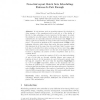Free Online Productivity Tools
i2Speak
i2Symbol
i2OCR
iTex2Img
iWeb2Print
iWeb2Shot
i2Type
iPdf2Split
iPdf2Merge
i2Bopomofo
i2Arabic
i2Style
i2Image
i2PDF
iLatex2Rtf
Sci2ools
104
click to vote
ESA
2007
Springer
2007
Springer
Non-clairvoyant Batch Sets Scheduling: Fairness Is Fair Enough
In real systems, such as operating systems, the scheduler is often unaware of the remaining work in each job or of the ability of the job to take advantage of more resources. In this paper, we adopt the setting for non-clairvoyance of [3,2]. Based on the particular case of malleable jobs, it is generally assumed in the literature that “Equi never starves a job since it allocates to every job the same amount of processing power”. We provide an analysis of the competitiveness of Equi for the makespan objective which shows that under this more general setting this statement is at the same time true and false: false, because, some jobs may be stretched by a factor as large as, but no more than, ln n ln ln n with respect to the optimal, where n is the size of the largest set; true, because no algorithm can achieve a better competitive ratio up to a constant factor. In this paper, we extend the results in [2,11] to the batch scheduling of sets of jobs that go through arbitrary phases: us...
| Added | 07 Jun 2010 |
| Updated | 07 Jun 2010 |
| Type | Conference |
| Year | 2007 |
| Where | ESA |
| Authors | Julien Robert, Nicolas Schabanel |
Comments (0)

